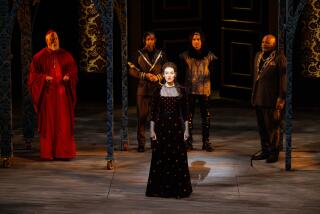‘1776’ Musical Restored to All Its Glory
- Share via
Too often, motion-picture studios trimmed films for economic, not artistic, reasons to get more showings in theaters. Now, with the growing popularity of laser discs, films truncated or relatively short-lived in their earlier incarnations are being restored to former glory, or notoriety.
A notable rescue is director Peter M. Hunt’s 1972 musical “1776” (Pioneer, letterboxed, digital stereo sound, two discs, $90), with screenplay by playwright Peter Stone and music and lyrics by Sherman Edwards of the Tony-winning play.
Jack L. Warner “wanted to do this show because he was a patriot, in his own way,” says Hunt of the not-too-well-known musical chronicling the 27 days in the Continental Congress leading to the signing of the Declaration of Independence. But what it was, he says on an informative second audio track. was “a piece that came out of the Watts riots . . . the Vietnam War . . . it’s a piece about revolution.”
The restoration is primarily the work of Pioneer’s Joseph Caporiccio, who instigated the project in April, 1991. The result is one of the most dramatic re-creations yet in the short history of laser discs. When Warner Bros. released the film, Warner sliced 40 minutes from it, including the musical number “Cool Considerate Men”--a pleasant surprise now on laser.
Also missing for the last two decades from all but the first two theatrical showings was the overture, put back from “tiny little pieces” tracked down, like much of the rest, in a search worthy of Sherlock himself. Three missing verses of “Piddle, Twiddle and Resolve,” a song Warner personally jump cut “with a pair of scissors,” also play fully here.
The film was shot in 44 days--”a very short time for a picture, especially a musical”--on a $4-million budget, “very little for 1972,” says Hunt.
One way the then-inexperienced film director could do it so efficiently was by editing it “in my head.” “The picture was by and large camera cut,” he says.
The now-180-minute film, on two discs, features 70% of the original stage cast, among them William Daniels as John Adams; Ken Howard as Thomas Jefferson; Howard da Silva as Benjamin Franklin; and Blythe Danner as Abigail Adams.
In many instances, it’s fairly easy to tell which scenes were restored, as they don’t all match the colors of the original release. The original negative was cut for the film’s release and the snipped scenes thought destroyed, though a good deal had been surreptitiously saved by the film editor.
For the first time, the full stereo soundtrack, pieced together from unmixed 16-track master tapes from Columbia Records, can be heard as envisioned--but not heard when the film was released.
Also pulled from the 1972 musical bin of lost productions is Ross Hunter’s musical production of--sorry, Frank Capra--”Lost Horizon” (Pioneer, letterboxed, digital stereo sound, two discs, $60). How could so much talent--Peter Finch, Liv Ullmann, Michael York, Sally Kellerman, John Gielgud--be part of a musical this bad? Hard to say.
It must have sounded like paradise in pitch meetings. Its pedigree includes a screenplay by Larry Kramer based on the James Hilton novel that inspired the classic ’37 Capra odyssey of Shangri-La starring Ronald Colman. Music by Burt Bacharach with lyrics by Hal David and musical numbers staged by Hermes Pan can only be appreciated as high camp.
The rather large banding reveals a Shangri-La that looks like a Vegas hotel reject, and at times it feels too full a transfer for the TV screen, with hot spots streaking all over the place. But as a curiosity, it’s hard to beat.
More to Read
Only good movies
Get the Indie Focus newsletter, Mark Olsen's weekly guide to the world of cinema.
You may occasionally receive promotional content from the Los Angeles Times.








